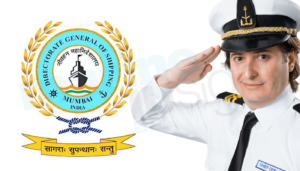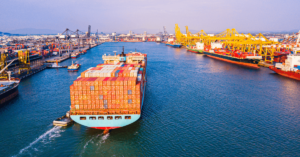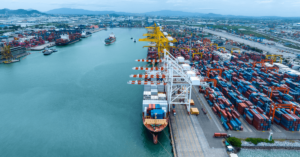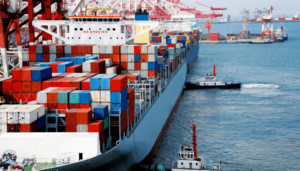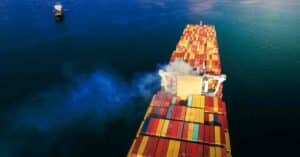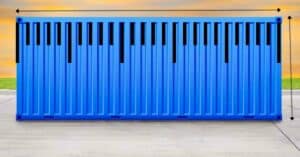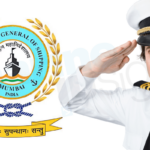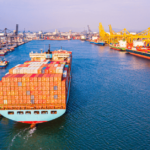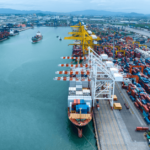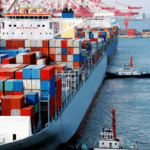What is Non-Vessel Operating Common Carrier (NVOCC)?
Large organisations and companies often ship-in their requirements of raw materials and ship-out the finished goods. For this, they deal directly with the shipping lines or get it done through Freight Forwarders who offer service at the point of loading as well as unloading. They may hire containers for this purpose or ship as consolidated cargo, the costs of which they will recover easily.
However, small business units or individuals may find it difficult to deal directly with large shipping lines and freight forwarders as they might not need an entire container to ship their goods in or out. Such small business units and individuals may also not find it cost-effective to deal with such large companies.
This is where special agencies known as Non-Vessel Operating Common Carriers (abbreviated to NVOCC) step in. NVOCCs make the entire process of importing or exporting cargo hassle-free and cost-effective by being the single point of contact for the customer. This arrangement is found to suit small and medium-sized organizations rather well.

An Introduction to NVOCCs and Their Main Functions
Often the terms NVOCC and Freight Forwarder are used to mean the same entity though there are certain differences between the two.
As the name suggests, Non-Vessel Operating Common Carriers (NVOCC) does not own or operate ocean transport vessels. Instead, they make arrangements with ship owners, charterers, or shipping lines for transportation of cargo under their own Bill of Lading known as the House Bill of Lading (HBL).
This is the main feature that differentiates it from the VOCCs or the Vessel Operating Common Carriers. Some of the top VOCCs around the globe include Maersk, APL, CMA CGM, etc.
NVOCCs sell cargo or container space onboard mainline transport vessels, to their customers. They lease or rent this space onboard ships, and sell it to their clients.
In most cases, they arrange loading of cargo from the customer facility and the transfer of such loaded cargo to the gateway ports. They also undertake the delivery of goods to the consignee at the destination.
But it must be noted here that as a general practice, NVOCCs deal mostly with Freight Forwarders directly to maintain unbiased rates.
NVOCCs do not generally own warehouses but some of them may have their own container fleet. Depending on the size of their operations, some of them may even own warehouses or other storage sites. They may also offer services such as cargo consolidation, deconsolidation, and using out-sourced services such as container cleaning, and repair.
Since the maritime industry is vast, it comes with its fair share of challenges. The mechanisms and procedures are complex and can be difficult to understand, especially for newcomers to the shipping business.
When shipping freight through containers, one has to consider many factors such as delivering goods to a container yard or Container Freight Station (CFS), proper packing and stuffing of goods, safe passage during a journey, proper deconsolidation at the destination, and lastly, clearing the goods through customs and other checks.
To go through these procedures smoothly and remove any associated problems, certain businesses use NVOCCs as their intermediary. By handling these processes for the clients, they take away many of the challenges.
To get a clear picture of how they operate, consider the following examples. Despite an abundance of airline offices and online booking methods, many people still tend to get their flight bookings and hotel reservations done through travel agencies or other such organizations.
Take the case of searching for a house – either to buy or to rent. People often reach out to realtors or brokers instead of directly contacting the house owners. The reason these middlemen or brokers are still in great demand today is because they take away the challenges people face while using certain services.
Why Should You Go Through an NVOCC?
Ease of doing business
NVOCCs offer you the flexibility of dealing with a smaller organization than a large one, such as a large shipping line. This matters to small business organizations, especially those with a small workforce or IT infrastructure.
The bargaining power of such small to mid-size companies may also be limited and they may find themselves struggling to get better rates from large shipping agents or freight forwarders. Bureaucracy and long-drawn processes are often cut short in NVOCCs to facilitate ease of doing business, without cutting corners.
Better Rates
NVOCCs are often in a better position to give you a lower rate than a mainline shipping agency. Now, how do they manage this? NVOCCs negotiate and get better rates from shipping lines for giving them bulk business. They may pass on some of these savings in the form of better rates to the customer. Small business owners by themselves would not be able to obtain this reduced rate if they directly contacted a shipping line.
Personalized Service
One main advantage when you deal with NVOCCs is that they offer seamless and personalized service to their clients, unlike a large shipping company that usually deals with a very large number of customers. All the logistics functions can be entrusted to the NVOCC who can offer these services to you. It can also ensure that you get the best freight rates whenever possible.
NVOCCs are able to offer several sailing options since they work with different ocean transport carriers.
Tracking your cargo is critical when it comes to meeting business deadlines and commitments. Most NVOCCs offer online Track and Trace facilities that help businesses to find where their cargo is during transit. Information on lead-time (sailing time from origin to destination) patterns and trends is valuable to businesses for planning and forecasting alike.
Efficient Network with Local Bodies
NVOCCs usually maintain a good network of contacts with local trucking associations, trade unions, the Port Customs, etc. Such a diverse and effective network helps to get the work done smoothly and with minimum interruption. An NVOCC with good contacts and standing in the industry can therefore help mitigate the risks associated with trucking problems, labour unions – especially at ports, and other such situations that are seen as normal collateral by large shippers and freight forwarders.
Ease of Documentation
NVOCCs issue the Bill of Lading themselves. When it is issued by an NVOCC, it is called a House Bill of Lading or HBL. This makes the process of documentation much easier for the customer.
Documentation and the Legal Aspects of Using NVOCCs
Whether you use the services of a mainline shipping company, freight forwarder, or an NVOCC, it is important to understand the legal ramifications, if any.
As we have seen in the earlier sections, an important feature of an NVOCC is that it undertakes to transport cargo under its own Bill of Lading also called the House Bill of Lading (HBL), through transport vessel operators.
On the other hand, the Master Bill of Lading (MBL) is issued by the ocean carrier to their agent or the NVOCC. The HBL is issued directly by the NVOCC to the consignor or shipper.
The consignee in an MBL will be the ocean carrier’s agent or destination NVOCC, while an HBL will show the actual importer or receiver as the consignee. The two documents will therefore be almost similar except in the shipper, consignee, and notify party fields.
The HBL, like the Original Bill of Lading (OBL), is a negotiable document and proof of ownership of goods by the customer. Some NVOCCs have agents who take care of issuance of the House Bill of Lading and other such related paperwork. The NVOCC, therefore, acts as agents to these ocean transport carriers.
Non-Vessel Operating Common Carriers are the customers for VOCCs, while they are the carriers for the end customer or owner of the commodities that are shipped.
An NVOCC normally enters into an agreement with ocean carriers to provide business to them. This could mean, for example, a certain number of TEUs (Twenty Equivalent Units) for a specified period. The ocean carriers may offer them preferential rates and payment conditions for their bulk orders.
Governing Bodies and Associations
Unlike the Freight Forwarders who have an association to represent them and work for their benefit (International Federation of Freight Forwarders Associations – FIATA), or the Ocean Freight Carriers who come under Ocean Alliances, the NVOCCs do not have any organization or body representing them. They function as independent operators. However, NVOCCs are covered under the following Maritime Regulations Act and are recognized by the International Chamber of Commerce.
NVOCCs and The Shipping Act of 1984
NVOCCs are regulated by the Shipping Act of 1984. This bill was introduced by the 98th United States Congress for the improvement and development of the international ocean commerce transportation system of the United States. Other countries where NVOCCs operate, often have their local maritime laws for business regulation.
NVOCCs and the International Chamber of Commerce (ICC)
NVOCCs are recognized by the International Chamber of Commerce (ICC) headquartered in Paris, France. The ICC represents more than 45 million companies worldwide. It maintains a Register of all Non-Vessel Owning Common Carriers. NVOCCs that demonstrate greater industry compliance and follow ethical business practices are ranked higher by the ICC.
Some of the Leading NVOCCs of the World
Expeditors International, Seattle, USA
Based in Seattle, Washington, this is a top US NVOCC that operates globally. Since being founded in 1979, it has been at the forefront of shipping and freight forwarding. Its revenue has steadily been on the rise and it netted a return of over USD 8 billion in 2018. In 2019, it handled cargo to the tune of 160,540 TEUs. Expeditors International has operations with leading shipping companies such as Maersk, Evergreen Line, MSC, etc.
Apex Group, San Francisco, California, USA
Established in 1990 with its headquarters in California, USA, the Apex group is on the top of the list with other leading NVOCCs. Handling more than 425,000 TEUs of freight and 20,000 tonnes of airfreight per year, they also have 600,000 square feet of warehouse space in the USA.
C. H. Robinson, Eden Prairie, Minnesota, USA
Based out of Minnesota, USA, C. H. Robinson is a leading NVOCC. They handle freight volumes of about 159,000 TEUs annually that roughly translates to 18 million shipments per year. They have a strong multi-modal transport operation that aids in the smooth functioning of their NVOCC operations.
OEC Group of Taiwan
Another leader in NVOCC operations, the OEC Group headquartered in Taipei, Taiwan was founded in 1981. It has operations in Europe, North America, and Asia and handles about 149,000 TEUs of freight annually. Most of this freight is transported between Asia and the USA.
Kuehne Nagel of Switzerland
Kuehne Nagel International started in Germany in 1890, is a company that operates out of Schindellegi, Switzerland. They handled freight volumes close to 137,000 according to statistics of last year (2019). Kuehne Nagel International is a large group known for its NVOCC operations worldwide, besides being one of the world’s top freight forwarders, and logistics operators.
Drawbacks of NVOCCs
NVOCCs may have several benefits for the customer, but they come with their fair share of drawbacks too. Since they normally do not own ocean carriers, containers, or warehouses, they are sometimes considered to be at the mercy of these service providers. Sailing schedules could change and the shipping company could keep them in the dark about it. There could also be a potential delay or a lag in receiving information.
The NVOCC might therefore be delayed in passing on this information to their customers. Similarly, issues relating to loading and unloading or warehousing conditions may be masked from the NVOCC that could have serious repercussions, such as damage to cargo as in the case of perishable goods, etc.
This is where the role of a dependable and responsible NVOCC comes into play. Those with the right contacts and relationships with supplementary organizations and government bodies are able to fare better under such difficult situations.
Having the right NVOCC partnership is critical for business organizations as it can help get their cargo in and out seamlessly.
Related Reading:
Rotterdam Rules – Redefining and Introducing the Electronic Bill of Lading
A Guide To Verified Gross Mass (VGM) For Shipping
Bill Of Lading in Shipping: Importance, Purpose, And Types
Disclaimer: The authors’ views expressed in this article do not necessarily reflect the views of Marine Insight. Data and charts, if used, in the article have been sourced from available information and have not been authenticated by any statutory authority. The author and Marine Insight do not claim it to be accurate nor accept any responsibility for the same. The views constitute only the opinions and do not constitute any guidelines or recommendation on any course of action to be followed by the reader.
The article or images cannot be reproduced, copied, shared or used in any form without the permission of the author and Marine Insight.
Do you have info to share with us ? Suggest a correction

About Author
Hari Menon is a Freelance writer with close to 20 years of professional experience in Logistics, Warehousing, Supply chain, and Contracts administration. An avid fitness freak, and bibliophile, he loves travelling too.
Latest Maritime law Articles You Would Like:
Latest News
- What is the Purpose of DG Shipping?
- What are Logistics Risks?
- How Port and Terminal Operators Can Control Emissions?
- Minimum Quantity Commitment (MQC) and Liquidated Damages in Container Shipping: Concept and Relevance
- MARPOL (The International Convention for Prevention of Marine Pollution For Ships): The Ultimate Guide
- The Ultimate Shipping Container Dimensions Guide
Subscribe To Our Newsletters
By subscribing, you agree to our Privacy Policy and may receive occasional deal communications; you can unsubscribe anytime.



